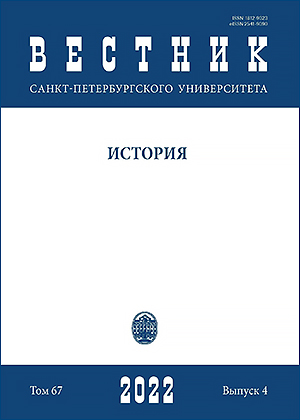Moscow's Position on the Remilitarization of the Rhineland
DOI:
https://doi.org/10.21638/spbu02.2022.410Abstract
The article examines the problem of the remilitarization of the Rhineland by Nazi Germany in March 1936 through the prism of the perception of this event in the Soviet military and political-diplomatic circles. Special attention is paid to the analysis of archival materials introduced into scholarly circulation for the first time, allowing a new look at the position of the USSR during the development of crisis trends in the Versailles system of international relations. The author comes to the conclusion that the Rhineland crisis played a crucial role in changing the balance of power in Europe, dramatically strengthening the position of Nazi Germany and weakening the position of France. Great Britain, after the remilitarization of the Rhineland, embarked on the path of appeasing the aggressors. In fact, this event was the starting point of the crisis of the interwar order, which eventually led to the outbreak of World War II. Surrendering one position after another and making concessions to Hitler’s Germany, Great Britain and France were unable to achieve their main goal – to prevent a new world war, only strengthening the confidence of European dictators in the expediency of achieving their goals by force. In these difficult conditions, as archival documents show, there was a clear understanding in Moscow how dangerous the development of destructive events in European politics was. When forming its own foreign policy line, the Kremlin objectively assessed both the true intentions of the Hitler regime and the essence of the foreign policy maneuvers of Western democracies.
Keywords:
remilitarization of the Rhineland, Treaty of Versailles, Locarno Agreements, Soviet foreign policy, Franco-Soviet Pact, policy of appeasement, Nazism, League of Nations, World War II
Downloads
References
Downloads
Published
How to Cite
Issue
Section
License
Articles of "Vestnik of Saint Petersburg University. History" are open access distributed under the terms of the License Agreement with Saint Petersburg State University, which permits to the authors unrestricted distribution and self-archiving free of charge.





